一、多层异常捕获示例1:
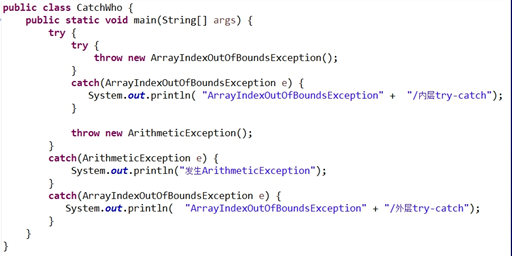
运行结果:

原因分析:
此题有两个try-catch异常捕获,第一个throw抛出的错误,被内层catch捕获,故最后一个catch未捕获,不显示;第二个catchArithmeticException,被同名即第二个catch捕获,显示发生ArithmeticException。
二、多层异常捕获示例2:
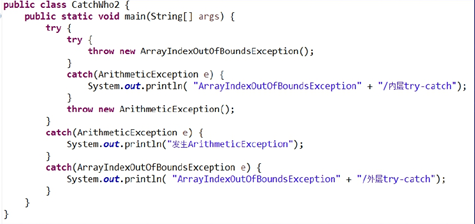
运行结果:

原因分析:
通过Debug运行分析知,当第一个throw抛出错误后,直接跳转到最后一个同名的catch捕获块,中间程序未运行。故总结,Java中,使用try-catch语法,一旦出错,就捕获该错误;若注销第一个throw错误,则会运行第二个catch,显示发生ArithmeticException。
三、多个try-catch-finall嵌套,方法总结:
示例:
public class EmbededFinally {
public static void main(String args[]) {
int result;
try {
System.out.println("in Level 1");
try {
System.out.println("in Level 2");
// result=100/0; //Level 2
try {
System.out.println("in Level 3");
result=100/0; //Level 3
}
catch (Exception e) {
System.out.println("Level 3:" + e.getClass().toString());
}
finally {
System.out.println("In Level 3 finally");
}
// result=100/0; //Level 2
}
catch (Exception e) {
System.out.println("Level 2:" + e.getClass().toString());
}
finally {
System.out.println("In Level 2 finally");
}
// result = 100 / 0; //level 1
}
catch (Exception e) {
System.out.println("Level 1:" + e.getClass().toString());
}
finally {
System.out.println("In Level 1 finally");
}
}
}
运行结果:
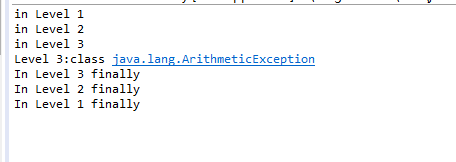
原因分析:
本程序共三个try-catch-finally嵌套,每个try、catch、finally均有输出语句。输出顺序为从第一个try开始执行三次,catch仅执行最里层level3,finally从最里层向外执行。
Finally主要用于解决资源泄露问题,它位于catch语句块后,JVM保证它一定执行,因此从最里层执行,毫无疑问。
由于finally语块中可能发生异常,比如此处的level3就发生java.lang.ArithmeticException异常,一旦发生此种异常,先前异常就会被抛弃,故仅仅最里层的catch捕获到异常,之后由于异常被抛弃,level2、level3的catch并未捕捉到异常不显示。
另外根据try-catch方法使用,try语句块一有异常,则找相应catch捕获经验得知,三个try中均为异常错误,故依次执行try中语句块。
四、try-catch-finally中finally不执行的特殊情况分析:
示例:
public class SystemExitAndFinally {
public static void main(String[] args)
{
try{
System.out.println("in main");
throw new Exception("Exception is thrown in main");
//System.exit(0);
}
catch(Exception e)
{
System.out.println(e.getMessage());
System.exit(0);
}
finally
{
System.out.println("in finally");
}
}
}
运行截图:
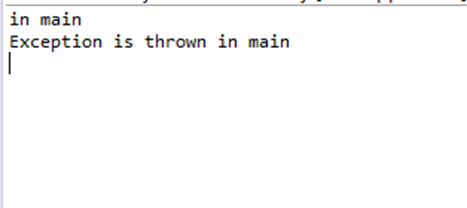
原因分析:
通常情况下,finally运行语句一定执行,但本题中有特殊情况,在catch中有“System.exit(0);”执行此语句后,就已经结束程序,故不会运行finally语句。
五、编写一个程序,此程序在运行时要求用户输入一个 整数,代表某门课的考试成绩,程序接着给出“不及格”、“及格”、“中”、“良”、“优”的结论。
要求程序必须具备足够的健壮性,不管用户输入什 么样的内容,都不会崩溃。
(一)源程序:
import java.io.IOException;
import java.util.Scanner;
public class TestScore {
public static void main(String[] args)throws IOException {
// TODO Auto-generated method stub
boolean flag=true;
while(flag) {
try {
System.out.println("输入学生分数:");
Scanner in =new Scanner(System.in);
int score=in.nextInt();
if(score<=100&&score>=0) {
//正常分数
if(score>=90) {
System.out.println("优!");
break;
}
else if(score>=80) {
System.out.println("良!");
break;
}
else if(score>=70) {
System.out.println("中!");
break;
}
else if(score>=60) {
System.out.println("及格!");
break;
}
else if(score>=0) {
System.out.println("不及格!");
break;
}
}
else//不正常int型分数
System.out.println("输入格式错误,请重新输入!");
}catch(Exception e) {
//输入格式错误
System.out.println("输入格式错误,请重新输入!");
flag=true;
}
}
}
}
(二)程序结果截图:
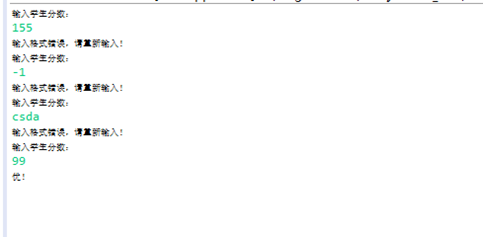
(三)结果分析:
(1)首先对输入格式分析是否正确,正确继续运行,不正确catch捕捉错误,通过while循环再次输入。
(2)若输入格式正确,但是分数不在正常范围内,则通过if-else判定,提示再次输入。
(3)使用if-else if()判断分数等级。